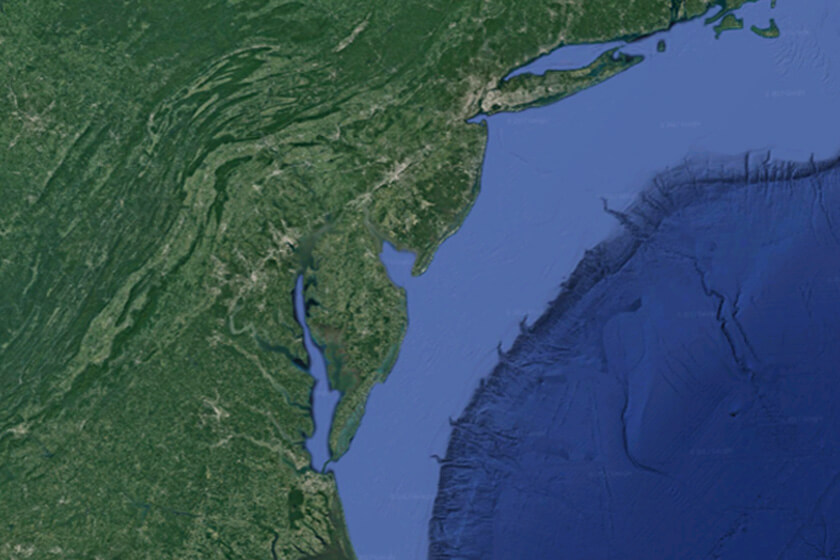A survey of residents in the six-state Mid-Atlantic region
SUMMARY
The Mid-Atlantic Coastal Policy survey was conducted by the Monmouth University Urban Coast Institute (UCI) and Polling Institute (MUPI) to better understand public opinion of coastal issues in general as well as elements of the recently adopted Mid-Atlantic Ocean Action Plan among residents who live in the six-state Mid-Atlantic region – New York, New Jersey, Pennsylvania, Delaware, Maryland, and Virginia. The survey covers the relative priority of coastal and ocean environment concerns across the Mid-Atlantic region; assessments of state and federal government performance on protecting the coast and ocean; opinions on different ocean monitoring and coastal energy resource policies and restrictions; and evaluations of the threat of climate change. The survey was made possible through the generous support of a grant from the Gordon and Betty Moore Foundation.
The Mid-Atlantic Coastal Policy survey was conducted by telephone using a random probability sample in each of the region’s six states from August 3 to 16, 2017. The final sample included 1,512 adult residents and has a statistical margin of error of ±2.5 percentage points. The margin of error for results in each of the individual states is ±6.2 percentage points.
Importance of the Ocean Environment
A majority of Mid-Atlantic residents say the condition of the ocean and beaches is important to their states’ economies. They also feel that protecting the coastal and ocean environment should be a high priority for their states.
- More that 8-in-10 Mid-Atlantic residents say the condition of the ocean and beaches is very (47%) or somewhat (36%) important to the economies of their states.
- A majority (58%) of Mid-Atlantic residents say protecting the coastal and ocean environment should be a high priority for their states. Residents of Delaware (68%), Maryland (65%), and New Jersey (64%) are most likely to rate this as a high priority while residents of Virginia (53%) and Pennsylvania (50%) are least likely. New Yorkers (60%) fall in the middle.
- Protecting the coastal and ocean environment competes with other policy priorities in these states. More residents place a high priority on improving the local economy and creating jobs (76%) and improving public education (75%). Lowering taxes (58%) comes in at the same high priority level as protecting the coast. Fewer residents feel that controlling growth and development should be a high priority (43%).
- Most Mid-Atlantic residents recognize that what happens on the coast of one state has an impact on the coasts of the other states in the region, including 52% who say this has a great deal of impact and 31% who say it has some impact.
- Six-in-ten Mid-Atlantic residents report visiting the beach or ocean along their region’s coast at least once in the past year.
Protecting the Mid-Atlantic Coast
Mid-Atlantic residents tend to give the government poor marks on its handling of coastal issues. They are more confident in their state governments’ ability to deal with coastal management issues than they are in the federal government.
- Nearly half (45%) of residents in the six-state region say efforts to protect coastal waters and beaches along the Mid-Atlantic coast are too little. Four-in-ten (39%) say efforts are about right and only 4% say efforts are too much.
- Only one-third (32%) of Mid-Atlantic residents say the government is doing an excellent or good job protecting coastal wetlands and wildlife habitats. About one-quarter (27%) say the government is doing an excellent or good job managing fish and other marine life and a similar number (26%) say the government is doing an excellent or good job collecting data that tracks the health of the ocean’s ecosystem. One-fifth (22%) say the government is doing an excellent or good job managing growth and development in coastal communities.
- Just over half of Mid-Atlantic residents have either a great deal (11%) or some confidence (40%) in their state governments’ ability to deal with coastal management issues over the next few years, but a significant minority have just a little (27%) or no confidence (17%). Residents of Delaware (68%) are the most likely to be at least somewhat confident in their state government on this issue, followed by residents of Maryland (64%), Virginians (59%), New Yorkers (52%), New Jerseyans (49%), and Pennsylvanians (39%).
- Just over 1-in-3 Mid-Atlantic residents say they have either a great deal (11%) or some (24%) confidence in how the federal government will handle coastal management issues over the next few years, while 6-in-10 have just a little confidence (24%) or none at all (37%).
Monitoring the Oceans
Residents of the six Mid-Atlantic states say it is important for the government to track the health of the oceans. They oppose reducing federal funding for these efforts and would support their states stepping in to take over this responsibility if federal funding is cut.
- Nearly all Mid-Atlantic residents say it is either very (61%) or somewhat (29%) important for the government to collect information and maintain databases that track the health of the oceans.
- A majority of Mid-Atlantic residents (54%) oppose a reduction in federal funding to monitor water quality and pollution along the region’s coast, while 37% support such a reduction.
- If federal funding is cut, a clear majority of Mid-Atlantic residents (60%) would support their states taking over ocean health monitoring responsibilities even if it means their states’ taxpayers will have to foot the bill. Three-in-ten residents (30%) would oppose shifting the cost to state taxpayers.
Ocean Resource Policies
Mid-Atlantic residents support maintaining restrictions on oil and gas drilling in the Atlantic Ocean but most have a favorable view of placing electricity-generating windmills off the coast.
- Six-in-ten Mid-Atlantic residents support designating certain areas of the ocean for special protection from fishing (60%) and a nearly identical number supports designating areas to restrict oil and gas drilling (62%).
- Just 26% support oil and gas drilling off the Atlantic coast, while 40% oppose it and 34% express no opinion. A majority of Mid-Atlantic residents (54%) say it would be a bad idea for the federal government to loosen recent restrictions on new drilling in parts of the Atlantic Ocean. Just 20% say it is a good idea, while 27% express no opinion.
- Nearly 6-in-10 Mid-Atlantic residents (58%) support placing electricity-generating windmills off the Atlantic coast, 10% say they oppose it, and 32% express no opinion.
Climate Change
The vast majority of Mid-Atlantic residents believe that climate change is occurring. They agree that both the federal and state governments should be doing more to deal with the impact of sea level rise.
- Three-quarters (76%) of Mid-Atlantic residents believe the world’s climate is undergoing change.
- A majority of Mid-Atlantic residents (55%) believe that predictions about sea level rise in the next 25 years causing greater risk to coastal areas are generally accurate. Another 19% believe these reports actually underestimate the risks, and one-fifth of residents (21%) say the threats are exaggerated.
- Nearly 6-in-10 Mid-Atlantic residents (59%) believe the federal government should be doing more to deal with the impact of sea level rise, another 3-in-10 (29%) say the federal government should do about the same as it is doing now, and just 7% say the government should do less.
- Half of Mid-Atlantic residents (51%) believe their states should do more to deal with sea level rise, 36% say they should do about the same as they are now, and 7% say they should do less.
The questions referred to in this report are as follows:
A. GENERAL PRIORITIES
A2.Here are some issues that your state may have to deal with. After I read each one, please tell me whether it should be a high, medium, or low priority for [READ IN STATE NAME]. [ITEMS WERE ROTATED]
A. Improving public education
B. Controlling growth and development
C. Lowering taxes
D. Protecting the coastal and ocean environment
E. Improving the local economy and creating jobs
B. CURRENT COASTAL MANAGEMENT
[READ IN STATE NAME]
Now I’d like to ask you some questions about the Mid-Atlantic Coast, which includes the beach and ocean areas of New York state, New Jersey, Delaware, Maryland, and Virginia.
B1.Do you think current efforts to protect coastal waters and beaches along the Mid-Atlantic coast are too much, too little, or about right?
B2.How much does what happens on the coast of one state affect the coasts of the other Mid-Atlantic states – a great deal, some, just a little, or nothing at all?
B3.How good a job is government doing at each of the following. Please respond with excellent, good, only fair, poor, or tell me if you don’t have an opinion on this.
[ITEMS WERE ROTATED]
A. Managing fish and other marine life
B. Protecting coastal wetlands and wildlife habitats
C. Managing growth and development in coastal communities
D. Collecting data that tracks the health of the ocean’s ecosystem
B4.How important is it for government policymakers to collect information and maintain databases that track the health of the oceans – very, somewhat, not too, or not at all important?
B5.How much confidence do you have in how the federal government in Washington will deal with coastal management issues over the next few years – a great deal, some, just a little, or none at all?
B6.How much confidence do you have in how the [READ IN STATE NAME] state government will deal with coastal management issues over the next few years – a great deal, some, just a little, or none at all?
C. COASTAL POLICY PROPOSALS
[QUESTIONS C1 & C2 WERE ROTATED]
C1.Do you support or oppose placing electricity-generating windmills off the Atlantic Coast, or do you have no opinion?
C2.Do you support or oppose drilling for oil or gas in the ocean off the Atlantic coast, or do you have no opinion?
[ QUESTIONS C3 & C4 WERE ROTATED]
C3.Do you support or oppose designating certain areas of the ocean for special protection where fishing would be restricted, or do you have no opinion?
C4.Do you support or oppose designating certain areas of the ocean for special protection where oil and gas drilling would be restricted, or do you have no opinion?
C5.The federal government is reviewing whether to loosen restrictions on new drilling that were recently put in place in parts of the Atlantic Ocean. Do you think it is a good idea or bad idea to loosen these restrictions, or do you have no opinion?
C6.Do you support or oppose reducing federal funding to monitor water quality and pollution along the Mid-Atlantic coast?
C7.If this funding is reduced, would you support or oppose having your state continue to monitor coastal water quality even if it means [READ IN STATE NAME] taxpayers will be responsible for the costs?
D. CLIMATE CHANGE
Now, I’d like to ask you some questions about the world’s climate.
D1. Do you think that the world’s climate is undergoing a change that is causing more extreme weather patterns and the rise of sea levels, or is this not happening?
D2.Some reports predict that sea levels will rise substantially in the next 25 years and that many coastal areas will be in much greater risk from storm damage and flooding. Based on what you have heard, do you think that this risk is generally accurate, generally exaggerated, or generally underestimated?
D3.Should the federal government in Washington do more to deal with impact of sea level rise, do less, or do about the same as it is now?
D4.Should the [READ IN STATE NAME] state government do more to deal with impact of sea level rise, do less, or do about the same as it is now?
E. DEMOGRAPHICS
E1.Over the past year, that is since September 2016, how many days did you spend on the beach or ocean along the Mid-Atlantic coast, which includes the coastal areas of New York state, New Jersey, Delaware, Maryland, and Virginia – would you say zero, one to five, six to 20, 21 to 50, or more than 50 days?
E2.Have you done any of the following activities along the Mid-Atlantic coast in the past year? [The Mid-Atlantic Coast includes the beaches and ocean of New York state, New Jersey, Delaware, Maryland, and Virginia.]
[ITEMS WERE ROTATED]: Have you done this in the past year or not?
A. Gone fishing, crabbing or clamming
B. Taken a boat, canoe, kayak or jet-ski out for pleasure
C. Gone swimming or sunbathing, or walked along the shore
E3.Does any member of your immediate family work in a job that involves fishing, boating, shipping, marine trades, the recreational use of the ocean, or any other business related to the ocean? [IF “YES” ASK: Is that you, someone else in your household, or another family member outside of your household?]
E4.What was the last grade in school you completed?
E5.What was your age on your last birthday?
E6.In politics today, do you consider yourself a Republican, Democrat, independent, or something else?
E7.Are you of Latino or Hispanic origin?
E8. Are you white, black or of Asian origin?
E9.So that we can group all answers, is your total annual family income before taxes: Under $50,000; from $50,000 to just under $100,000; from $100,000 to just under $150,000; or $150,000 or more?
E10.Respondent gender?
E11.Which county do you live in?
Click on pdf file link below for full report including methodology and results by key demographic groups.




